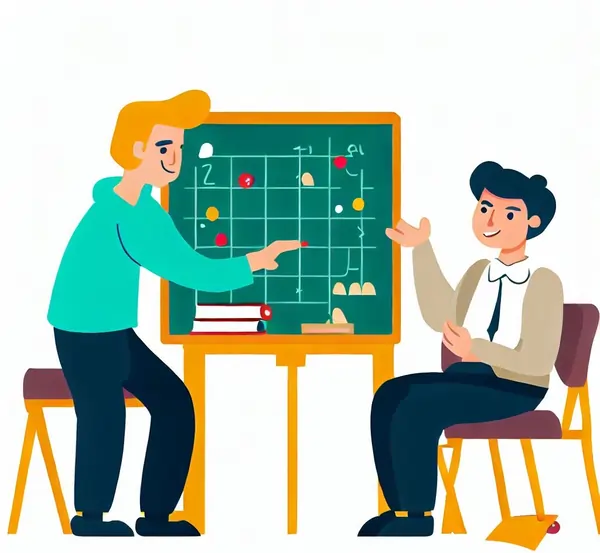Avail Your Discount Now
Discover an amazing deal at www.economicshomeworkhelper.com! Enjoy a generous 10% discount on all economics homework, providing top-quality assistance at an unbeatable price. Our team of experts is here to support you, making your academic journey more manageable and cost-effective. Don't miss this chance to improve your skills while saving money on your studies. Grab this opportunity now and secure exceptional help for your economics homework.
We Accept
- Understanding Repeated Games
- Cooperation: The Dilemma and the Solution
- Real-World Applications of Repeated Games and Cooperation
- Public Spending and Infrastructure Development
- Natural Resource Management
- Labor Relations and Negotiations
- Conclusion
Within the realm of game theory, the exploration of repeated games and cooperation takes on an indispensable role. These interconnected concepts delve deep into the intricate web of strategic interactions that unfold between individuals or entities over a sequence of encounters. Their significance is further amplified as they unveil invaluable insights into a multitude of real-world scenarios. Embarking on an illuminating journey, this article meticulously navigates through the tangible applications inherent in repeated games and cooperation. By doing so, it casts an illuminating beacon on an innovative vantage point for dissecting the realm of public spending. For those immersed in the dynamics of a game theory assignment, assimilating these concepts opens up an entirely novel avenue—a lens through which academic tasks can be approached with newfound freshness and perspective and helping to complete your game theory assignment
Understanding Repeated Games
At the heart of game theory lie repeated games, a dynamic framework where players find themselves entwined in the fabric of identical or analogous games on multiple occasions. In stark contrast to the realm of one-shot games, where decisions are hinged solely on the present instant, repeated games breathe life into a strategic dimension. This intricacy necessitates players to transcend immediate ramifications and ponder the enduring repercussions of their choices across successive rounds. The ripple effect of each move becomes palpable as actions cascade through time, painting a vivid tapestry of interwoven strategies. This concept does more than merely embellish theoretical discussions—it vividly reflects the intricate nuances of myriad real-world scenarios. From international negotiations echoing with the footsteps of diplomats to the subtle dance of businesses in competitive markets, the echoes of repeated games resound. It is a concept that resonates across domains—finance, politics, ecology, and more—illuminating the rationality behind decisions and the strategic choreography that defines our multifaceted interactions. Whether you're a student grappling with the intricacies of a game theory assignment or a decision-maker in the world of complex interactions, the comprehension of repeated games stands as an intellectual cornerstone. It not only unravels the mysteries of strategic deliberations but also furnishes a compass for navigating the labyrinthine terrain of cooperative behavior and calculated moves. Through the prism of repeated games, the world becomes a tapestry where each stitch in time is woven with the threads of strategy and cooperation, creating patterns that unfurl across the intricate canvas of life itself.

Cooperation: The Dilemma and the Solution
At the core of game theory lies the iconic prisoner's dilemma—an illustration that masterfully captures the intricate interplay between cooperation and self-interest. Picture this: two suspects ensnared in the clutches of law enforcement, their fates intertwined by a crime yet to be proven. The twist? The authorities lack the decisive evidence required for a concrete conviction. This sets the stage for a moral quandary, a fork in the road where the choices of these suspects diverge. Should both individuals opt for silence, a modest sentence awaits, reflective of their collective restraint. Yet, if one confesses while the other remains silent, the confessor emerges unscathed, leaving the silent one to bear the brunt of a severe penalty. And should both divulge their guilt, a moderate sentence is meted out—a compromise of sorts. This conundrum underscores a pivotal facet of human interaction—cooperation versus personal gain. Enter cooperation, a beacon of collective wisdom. While confessing may seem rational from an individual's standpoint (minimizing personal harm), cooperation—choosing silence—opens the gateway to a superior collective outcome. The ripples of this dilemma extend far beyond the realm of criminal justice. Its echoes resonate within environmental pacts where nations must choose between sustainable cooperation or exploiting resources for immediate gain. It finds relevance in the business arena, where collaborative partnerships often outweigh cutthroat competition. Even international diplomacy, where nations strive for the common good over individual interests, echoes the prisoner's dilemma. Integrating this cooperative undercurrent into your game theory assignment is akin to unearthing a hidden treasure trove of insights. It broadens the scope of decision-making, casting a fresh perspective on choices that extend beyond the individual. As you grapple with the complexities of strategic interactions, remember the prisoner's dilemma—a testament to the delicate balance between self-interest and the untapped potential of cooperation.
Real-World Applications of Repeated Games and Cooperation
Real-world applications of repeated games and cooperation extend across diverse domains, illuminating the essence of strategic interactions. Consider public spending—governments engaging with citizens in a cyclical dance of resource allocation. This mirrors repeated games as officials build credibility through consistent transparent decisions, nurturing cooperation for sustainable investments. Delve into natural resource management, where stakeholders collaboratively regulate usage for long-term viability, mimicking cooperative dynamics. Labor negotiations, too, thrive on repeated interactions, fostering trust and mutual benefit. These applications transcend theory, offering tangible insights into intricate dynamics. Whether in policy formulation, environmental stewardship, or industrial relations, the fusion of repeated games and cooperation forms a cornerstone for informed decision-making.
Public Spending and Infrastructure Development
In the intricate web of public finance, the convergence of repeated games and cooperation weaves a compelling narrative. Public spending decisions, an intricate tango between governmental bodies, taxpayers, and vested interests, exemplify the essence of repeated interactions. Visualize a scenario where a local administration stands at the crossroads of allocating resources for vital infrastructure projects—roads, public transportation, the lifeblood of a community. A pivotal undercurrent in this narrative lies in taxpayers' willingness to partake in this financial endeavor, juxtaposed with lingering concerns of corruption and mismanagement. This dynamic tableau finds its resonance in the realm of repeated games. Here, time is the canvas upon which the brushstrokes of reputation and accountability are painted. The local government, by consistently orchestrating judicious decisions and deploying resources with finesse, lays the foundation of trust—a cornerstone for cooperative engagement. As taxpayer funds transmute into tangible progress and societal well-being, the threads of cooperation entwine more securely . In this intricate dance, transparency emerges as the prima ballerina. The government's commitment to accountability forms the spine, enabling taxpayers to envision the symphony of progress their contributions compose. The ripples of their investments extend beyond the immediate, fostering a shared vision of prosperity. This confluence of trust and cooperation shapes the destiny of public spending plans, ushering them onto the path of long-term sustainability and growth. By discerning this symphony of interactions through the lens of repeated games, a profound revelation emerges—a revelation that underscores the delicate alchemy of trust and cooperation. It is within this fusion that the orchestra of public spending attains harmonious resonance, echoing the aspirations of a community bound together by their shared vision of progress.
Natural Resource Management
In the intricate tapestry of resource management, the threads of repeated games and cooperation interlace to create a blueprint for sustainable harmony. Picture a maritime expanse where multiple fishing boats navigate the same waters, their pursuits intertwined with the fate of the fish population and the livelihoods they sustain. In this vivid tableau, the choice between cooperation and short-term gain sets the stage for a complex narrative. Envision the impact of collaboration—a scenario where each vessel exercises restraint, limiting their catch to safeguard the delicate equilibrium of the aquatic ecosystem. This collective endeavor not only secures the future of the fish population but also sustains the livelihoods of those dependent on these waters. Yet, the siren call of immediate advantage can lure a single boat into overfishing, potentially reaping swift rewards but jeopardizing the very resource that sustains them. It's through the prism of repeated interactions that these fishing boats discover the power of cooperation. The implementation of quotas, the diligent enforcement of regulations, and the fostering of open communication emerge as the cornerstones of their shared approach. This collaborative dance shapes a sustainable equilibrium, effectively thwarting the looming specter of the "tragedy of the commons. This maritime metaphor, echoing through the tides of resource management, stands as a vivid testament to the potency of cooperative dynamics. As you delve into your game theory assignment, consider weaving this narrative into your tapestry. By demonstrating how cooperation emerges as the linchpin in resource management, you not only unveil the efficacy of these principles but also pave the way for a more sustainable future—a future where strategic interactions guide us toward harmony with our environment and with one another.
Labor Relations and Negotiations
Within the intricate domain of labor relations, the application of repeated games bestows a fresh lens upon the negotiations that unfold between employees and employers. Visualize a scenario wherein a labor union and a company stand on opposing sides of the table, grappling with the nuanced intricacies of wages and working conditions. In this delicate dance, the choice between confrontation and cooperation paints the canvas of their interactions. Imagine the repercussions of a confrontational stance—a swift but transient victory that may scar the foundation of their relationship. The echoes of strikes and disruptions reverberate, underscoring the fragility of such an approach. But delve deeper, and the realm of repeated games unveils a different path—one of strategic collaboration. Embracing this perspective, both parties acknowledge the dividends that cooperation yields. The passing of time becomes a crucible for trust to be forged, birthing a series of negotiations that nurture understanding. In this symbiotic tango, favorable outcomes cease to be a zero-sum game. Employers might recognize that fair wage increases, intertwined with productivity and flexibility, breed harmonious growth. Employees, in turn, realize that their prosperity is intertwined with the company's well-being. The essence of this cooperative approach underscores a crucial principle—the farsightedness of actions. As your game theory assignment takes shape, consider embedding this narrative. By illustrating how repeated games illuminate the merits of cooperation, you not only enrich your exploration but also contribute to a realm where labor relations transcend hostility, paving the way for enduring success on both sides of the bargaining table.
Conclusion
Repeated games and cooperation are fundamental concepts in game theory that find numerous real-world applications. From public spending to natural resource management and labor negotiations, these concepts offer valuable insights into strategic interactions over time. If you're working on a game theory assignment, integrating these concepts can provide you with a unique perspective that goes beyond theoretical scenarios. As you delve into the dynamics of cooperation and repeated games, you'll uncover a new lens through which to analyze the complexities of decision-making in various contexts.









